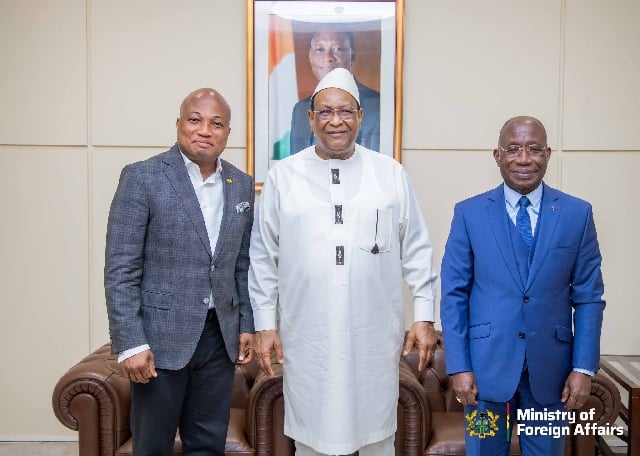The Ghanaian Minister for Foreign Affairs and Regional Integration, Samuel Okudzeto-Ablakwa, embarked on a two-day diplomatic mission to Côte d’Ivoire to address the urgent humanitarian situation faced by Ghanaian refugees who had fled across the border in the aftermath of violent communal clashes in Gbinyiri, located in the Savannah Region of Ghana. This visit underscores the Ghanaian government’s commitment to the well-being of its citizens, even those displaced beyond its borders, and its dedication to finding durable solutions to regional conflicts impacting its people. The warm reception accorded to Minister Okudzeto-Ablakwa by his Ivorian counterpart, H.E. Kacou Houadja Léon Adom, highlights the strong bilateral ties between the two nations and lays the foundation for collaborative efforts to address the refugee crisis.
The primary objective of Minister Okudzeto-Ablakwa’s visit was to assess the living conditions of the displaced Ghanaians and ensure their safety and dignity within Côte d’Ivoire. The recent outbreak of violence in Gbinyiri had forced many residents to seek refuge across the border, creating an immediate need for humanitarian assistance and long-term solutions to address the root causes of the conflict. The minister’s presence in Côte d’Ivoire served as a reassurance to the refugees that their plight had not been forgotten by their government and that efforts were underway to facilitate their eventual safe return home. His visit also aimed to strengthen cooperation with Ivorian authorities in managing the influx of refugees and ensuring their protection under international humanitarian law.
The minister’s itinerary included bilateral discussions with high-ranking Ivorian officials, offering a platform to strengthen diplomatic ties and explore avenues for collaboration in addressing the refugee situation. These discussions likely focused on coordinating humanitarian assistance efforts, sharing information related to the conflict and its underlying causes, and developing joint strategies for conflict resolution and the eventual repatriation of the refugees. Collaboration between the two governments was crucial not only for the immediate welfare of the displaced Ghanaians but also for the long-term stability of the region. By working together, Ghana and Côte d’Ivoire could address the shared challenge of cross-border population displacement and mitigate the potential for further conflict.
A significant aspect of Minister Okudzeto-Ablakwa’s visit involved direct interaction with the displaced Ghanaians residing in Ivorian refugee camps or host communities. These interactions provided the minister with firsthand accounts of the challenges faced by the refugees, allowing for a more accurate assessment of their needs and informing government policy regarding repatriation and resettlement. Hearing directly from the refugees enabled the minister to understand their concerns, anxieties, and hopes for the future, ensuring that any government interventions would be tailored to their specific circumstances. These personal interactions also served as a symbolic gesture of solidarity and support from the Ghanaian government, demonstrating a commitment to its citizens regardless of their geographical location.
The Mahama administration’s declared commitment to prioritizing the welfare and safety of Ghanaians, both within the country and abroad, emphasizes the government’s responsibility to protect its citizens and respond effectively to humanitarian crises. This commitment goes beyond providing immediate relief and encompasses efforts to address the root causes of conflict and create conditions conducive to sustainable peace and development in the affected regions. The government’s response to the Gbinyiri crisis, including Minister Okudzeto-Ablakwa’s diplomatic mission, demonstrates a proactive approach to conflict resolution and refugee management, emphasizing the importance of regional cooperation and international humanitarian principles.
In conclusion, Minister Okudzeto-Ablakwa’s visit to Côte d’Ivoire, prompted by the displacement of Ghanaians due to communal violence, represents a significant diplomatic effort to address a complex humanitarian crisis. The visit underscored the importance of bilateral cooperation, the commitment of the Ghanaian government to its citizens, and the urgent need for sustainable solutions to regional conflicts. The combination of high-level diplomatic discussions, on-the-ground assessments of refugee conditions, and direct interaction with the displaced population formed a comprehensive approach to managing the immediate crisis while also laying the groundwork for long-term stability and the eventual return of the refugees to their homes in Ghana. The success of these efforts will depend on continued collaboration between Ghana and Côte d’Ivoire, as well as the engagement of international humanitarian organizations and the sustained commitment of the Ghanaian government to the welfare of its displaced citizens.


